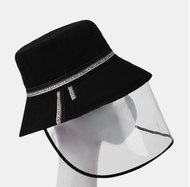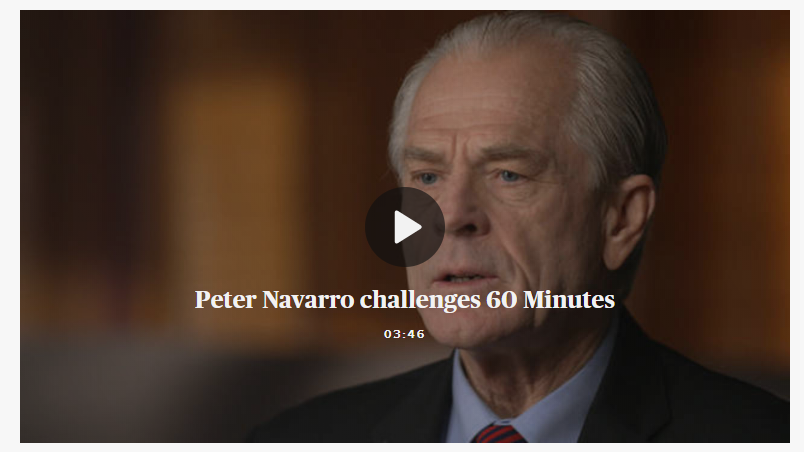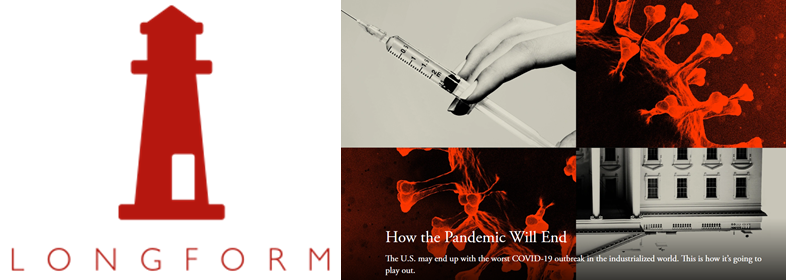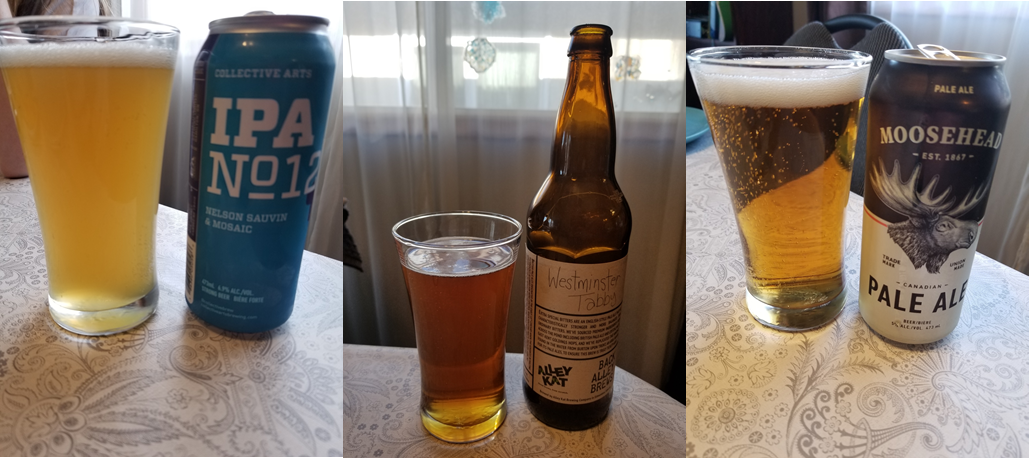|
Greetings from 53.5° north latitude. If my weeks had themes, this week's theme would have to be "The Triumph of the Introverts". I could see the struggle and the fatigue in the faces and hear in the voices of my friends and coworkers this last week. What seemed like a holiday a few weeks ago, a chance to hang out, try some new tech, ignore the commute, turned this last week into the slog of quarantine. The fact that we haven't hit the peak yet, that we have a significant amount of time before isolation ends, the fact that we should mentally prepare for another wave in the fall, has all taken its toll on those around me. But not everyone is doing poorly. Some of us, the introverts especially, are faring much better. One might even argue that we were made for these times. If you have a deep-seated need to be in physical contact with someone, you are going to be in a much worse place right now than if connection via video conference is sufficient for you. Mental health issues will be paramount while and after we deal with the physical issues. I'll point out the same mental health support videos that I highlighted in last week's entry. Watch them for yourself and those close to you, and share those with others in case they might benefit as well. Even if you are doing better than most because of your innate personality and genetic makeup, it is highly unlikely that you are immune from mental health concerns. Take care of yourself.  There were a few other COVID-related items worth highlighting this week. The first was this combination sun hat and face shield. My spouse is looking seriously at getting one, but for some reason I just cannot take it seriously. The company selling these hats has various other "Health Protection" items for sale, but the main categories of their products on their web site include "Spring Fashion" and "Accessory and Beauty" so I can't help but feel that this is nothing more than a cash grab. 60 Minutes broadcast an interview with Peter Navarro, who US President Trump appointed to lead the initiative to distribute Personal Protective Equipment. Watch that interview for a quick lesson in deflection and redirection, and to see pushback in action instead of leadership. In the end though, 60 Minutes comes out on top with this interview with their mic-drop moment when they highlighted their previous reporting on pandemic response after Navarro openly challenged their role and leadership. And speaking of a lack of leadership, take a read of this article and a look at the picture below to see what happens when poor leaders lead poorly. Note the vitriol of the Trump supporters with their MAGA hats and their "Don't Tread on Me" flags, all because of the American cellular-level need for loudly protecting personal freedoms, rekindling the "age-old U.S. debate over government regulation vs. personal liberty", fueled by a leader who just cannot lead.  There is more to life, well my life at least, than COVID, so let's talk about something else for a while, shall we? Cybersecurity is important to everyone, and I would be remiss if I did not pass on this note about CIRA's new Internet protection service they call "Canadian Shield". CIRA touts their DNS privacy service, ransomware blocking, and pornography filtering service as "enterprise-grade protection for all Canadians". It is super easy to setup and free. If you are Canadian and don't already have access to a similar service or commercial offering, there is no reason why you shouldn't configure your home network using CIRA's Canadian Shield settings.  Reading Pile: There was a lot of reading in my life this week, and I was able to finish one small book. Book #14 for 2020 was Susan Sontag's "Illness as Metaphor", the third book in our social science reading group hosted by Adam Greenfield. We only read excerpts of the first two books, but this week we read the whole book from Sontag. To be fair, it clocked in at a paltry 88 pages, but I will count it as a full book regardless. There was a lot of very powerful language in this book; language that made me think about the social "value" of diseases, and how two diseases can be viewed so differently. A lot of the book is focused on tuberculosis, and early in the book, Sontag discusses how the consumption and wasting comes from TB has lead to the skinny mindset in the twentieth century. Twentieth-century women's fashions (with their cult of thinness) are the last stronghold of the metaphors associated with the romanticizing of TB in the late eighteenth and early nineteenth centuries. Sontag then contrasted the new waifish chic brought along by TB with how their male contemporaries stereotyped themselves. Gradually, the tubercular look, which symbolized an appealing vulnerability, a superior sensitivity, became more and more the ideal look for women—while great men of the mid- and late nineteenth century grew fat, founded industrial empires, wrote hundreds of novels, made wars, and plundered continents. I'm glad we read Sontag's book, but I couldn't help but feel it was dated. The book quotes Kafka a couple times as he ultimately died from TB in 1924. One quote from him from 1920 said that he had an illness of the mind that had moved to his body. Sontag's book was written in 1978, meaning there is a span of 58 years between his quote and Sontag's book. At present in 2020, there have been 41 years since Sontag wrote this book, which is getting close to the gap between Kafka and Sontag. Think how much has changed in collective thinking in those 41 years, and it seems that a 2020 Sontag book on the same topic would arrive at new conclusions. It is unfortunate that Sontag passed away so many years ago, as it would be insightful to read a 2020 version with a new foreword by the author. New Words:
Lots of new words this week from a combination of War and Peace, The Count of Monte Cristo, Sontag's book discussed above, and a new science fiction book that I will hopefully be able to finish this week. corvée [kôrˈvā] NOUN (historical)
hortatory [ˈhôrdəˌtôrē] ADJECTIVE
etiology [ˌēdēˈäləjē] NOUN
enervate [enervate] VERB
garret [ˈɡerət] NOUN
parvenu [ˈpärvəˌn(y)o͞o] NOUN (derogatory)
rachitis [rəˈkīdəs] NOUN
philippic [fəˈlipik] NOUN (literary)
autophagy [ôˈtäfəjē] NOUN (biology)
laity [ˈlāədē] NOUN
exemplum [iɡˈzempləm] NOUN
orgone [ˈôrɡōn] NOUN
apposite [ˈapəzət] ADJECTIVE
semiotic [ˌsemēˈädik] ADJECTIVE
lacuna [ləˈk(y)o͞onə] NOUN
orthorexia [ˌôrTHəˈreksēə] NOUN
perspicacious [ˌpərspəˈkāSHəs] ADJECTIVE
pediment [ˈpedəmənt] NOUN
0 Comments
Greetings from 53.5° north latitude where it is unbelievably, and frustratingly, still winter.
This week saw the world surpass 1.8 million confirmed COVID cases, and the US going over the 20,000 mark to become the country with the most confirmed COVID-related deaths globally. Here in Alberta, we hit 40 deaths so far, but that is a far cry from the estimated range of 400 and 3,100 deaths as modeled by AHS and presented to the public by the Premier (video below). We are only 10% of the way to the best-case scenario right now, which is really staggering. Is there a bright side to all of this? Is there something positive we can take away? I think there is, whether it be the wonderful in-home concerts we can watch, the positivity from so many people, or the companies around the world retooling so they can focus on creating life-saving equipment. Plus so many of us are finding ways to stay connected even if we are alone. I remember back in my twenties hearing for the first time that there was a difference between being alone and being lonely. If we can stay alone or at least only together with our household while still finding ways to stay connected, we can come out of this okay. Don't get me wrong, the world will be changed, and mental health will be greatly impacted in addition to the more obvious physical issues. But that doesn't mean the world will be or has to be worse than it is now.
Reading Pile:
I am taking advantage of as many opportunities as possible to do something new. The most obvious at this point is a reading group I joined hosted by author Adam Greenfield. This isn't a typical book club or even a contemporary international reading, but rather a group reading about specific theories and books in the social sciences.
Our first book was "Notes Toward a Performative Theory of Assembly" by Judith Butler. My proviso for this is that I didn't read the whole book like the rest of the group. I thoroughly read about ten percent and then skimmed the rest. Butler's reputation of writing obtuse and hard-to-read prose is apparently well-deserved. Not that I knew about Butler's reputation, or even Butler at all, prior to the group discussion.
Our second book which we delved into this week was "The Wretched of the Earth" by Frantz Fanon. Again, never heard of him but his writing was much more consumable albeit dated. Written in 1961, Fanon wrote in the language of the day: Man this, man that, women as an object. Trying to get past that, we focused on the chapter "On Violence" which discusses the need for the colonized to stand up to the colonizer.
At the individual level, violence is a cleansing force. It rids the colonized of their inferiority complex, of their passive and despairing attitude. --Franz Fanon
I am grateful for the opportunity to be exposed to different thinking, different intellectuals, and completely different discussions, but I am concerned with my ability to contribute to the ongoing discussion. That said, I did propose that we discuss the use of the "war" moniker and metaphor in our COVID responses and that received enthusiastic support. Cue up some Susan Sontag!
Switching over to the "listening pile" for a minute, I was able to find time to dive into the recent Longform interview with science writer Ed Yong. Yong had just completed a great article on COVID for The Atlantic, which is definitely worth reading in addition to or instead of the Longform interview. While the whole interview was enjoyable, my favourite part was in the first few minutes as they were getting settled and Yong compared his COVID-reality life to a combination of "Groundhog Day" and a Michael Bay movie: stunningly mind-numbing repetition followed by scare-you-out-of-your-seats moments. Yep, pretty much sums up the last month. The last bit of non-fiction reading this week was a throwback to 1997. Back in January, I commented on the Longform interview with Kevin Kelly, former editor at Wired. This 1997 article was co-written by Kelly and comments on the soon-to-be demise of the browser and the coming wonders of push technology. 
It is interesting to read something from twenty-three years ago, especially given that the Internet as we know it was barely a couple years old at the time of publication. A lot has changed, of course. Talk of T1 lines seems antiquated, even though I can remember being proud to commission my first T1 installation not long before that article came out.
We can expect a billion Web pages by 2000. Some of them will even be worth reading. -- Wired, March 1997
Where the article was most prescient was its predictions regarding technology pervasiveness and the dependency content producers would have on advertising. At one point, the authors predict that this new world of push technology, which has somewhat been replaced with notifications, will be "gentle, in-your-face, intermittent, in the background, or always on." The always-on-ness of our world these days is definitely one of our defining societal problems. See my comments from last October regarding Michael Harris's book "Solitude: A Singular Life in a Crowded World". As for their other prediction, some form of the word "advertising" appears eight times throughout the article. Maybe the authors were afforded a crystal ball and could see their magazine's web page covered in ads from their parent company and lifestyle brand, Condé Nast.
On to fiction. First, I am continuing to read "The Count of Monte Cristo" and am thoroughly enjoying it. It holds up quite well at nearly 200 years old. One of my favourite lines so far in the book came in the penultimate paragraph of Chapter XXX, and it really sets up the revenge section of the novel.
I have taken the place of Providence to reward the good; now let the avenging God make way for me to punish the wrongdoer! --The Count of Monte Cristo, Chapter XXX 
I also finished another book this week. Book #13 for 2020 was "Seraphina", by Rachel Hartman. This was a wonderful and unique Young Adult novel, that earns the YA moniker in all the best ways. The eponymous protagonist was not an orphan, which is of course the single worst trope in YA novels, plus was part of the solution but realized she could not cannot do it alone. No pushy teen sidestepping the lame-brained adults in this novel. There was a great message about the importance of family and friends and how solutions are best solved together and not alone. I'm not an expert on the middle ages, but the setting seemed to be a realistic, wealthy monarchy set in a middle ages equivalent world. Hartman was able to introduce IRL middle ages items and terms, such as houpelandde, oud, and sackbut (see the New Words section below for all three), and added to the dragon mythos with new words like saar, saarantras, and dracomachia (you will have to read the book to get definitions for these). All in all, a great novel worthy of your time and energy to read whether you are in the YA time frame or just like a good novel.
New Beers:
Three new beers this week from three different Canadian breweries, Collective Arts, Alley Kat, and Moosehead. The first was the Collective Arts No. 12 IPA which was a nice hazy IPA with a lot of citrus and a refreshing taste. (3.5 / 5). The second was the Alley Kat Westminster Tabby from their Back Alley Brews line. This Extra Special Bitter benefited from the authentic British malts, and according to the label Alley Kat even replicated the minerals in the water from Burton Upon Trent in the UK. It is a shame this is a limited edition beer that isn't sticking around. (3.75 / 5) Last up was the Moosehead Pale Ale. A pale ale is by definition pale which implies not a huge amount of flavor or aroma. Moosehead's Pale Ale was a decent representation of a style that doesn't have a lot going for it, in my opinion. Decent, drinkable, but pretty forgettable. (3.25 / 5)
New Words:
Lots of new words this week, partly because I caught up with all of the words from "Seraphina", but also because of the Fanon, Butler, and Monte Cristo readings. phlegmatic [fleɡˈmadik] ADJECTIVE
probity [ˈprōbədē] NOUN (formal)
postulant [ˈpäsCHələnt] NOUN
superadded [ˌso͞opərˈadəd] ADJECTIVE
houppelande [hüˌpländ] NOUN
oud [o͞od] NOUN
sackbut [ˈsakˌbət] NOUN
auto-da-fé [ˌôdədəˈfā] NOUN
tonus [ˈtōnəs] NOUN
puerile [ˈpyo͝orəl, ˈpyo͝orˌīl] ADJECTIVE
hieratic [ˌhī(ə)ˈradik] ADJECTIVE
enchiridion [ˌeNGkəˈridēən, ˌenkī-] NOUN (formal)
ab ovo [ab ˈōˌvō, äb] ADVERB
salutary [ˈsalyəˌterē] ADJECTIVE
mot juste [ˌmō ˈZHo͞ost] NOUN
apotheosis [əˌpäTHēˈōsəs] NOUN
prevaricate [prəˈverəˌkāt] VERB
redoubt [rəˈdout] NOUN (military)
|
Archives
April 2022
Categories
All
|






 RSS Feed
RSS Feed
